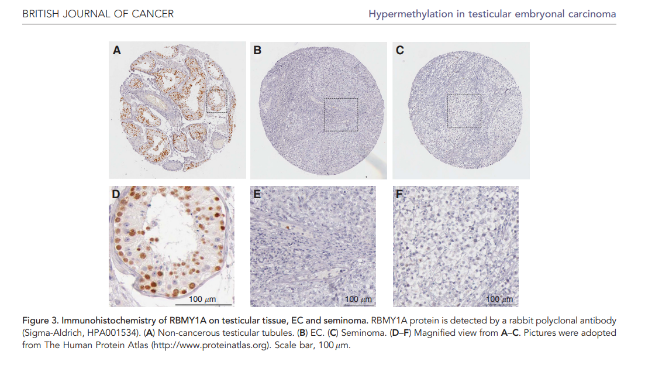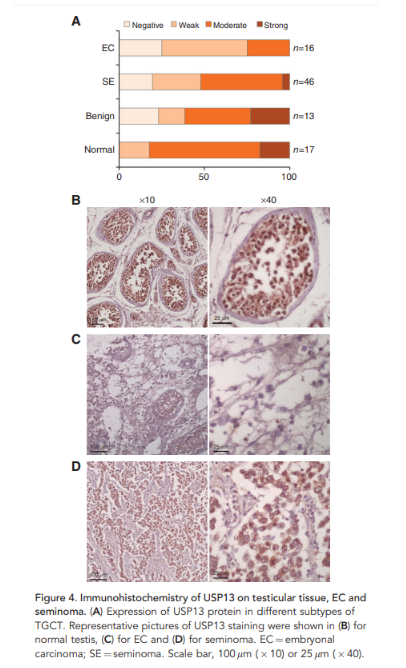
Changes in Genes Linked to Testicular Cancer Development
Hypermethylation of genes in testicular embryonal carcinomas. Br J Cancer. 2016 Jan 19.
The study in reference focuses on identifying epigenetic changes during testicular neoplastic transformation, specifically in testicular embryonal carcinoma (EC). The researchers profiled DNA methylation of six EC samples, representing different stages of divergent invasiveness, as well as non-cancerous testicular tissues obtained from BioChain. Matched RNA samples from the same specimens were also obtained to allow for comparison between the gene expression profiles of the normal and cancerous tissues.
Researchers identified 1,167 tumor-hypermethylated differentially methylated regions (DMRs) across the genome and found 40 genes/ncRNAs with hypermethylated promoters. Quantitative RT-PCR confirmed downregulation of 8 out of 9 of the genes, including five sex-linked genes: X-linked genes STAG2, SPANXD/E, and MIR1184, and Y-linked genes RBMY1A1/1B/1D and FAM197Y2P. RBMY1A is a testis-specific gene for spermatogenesis, and its expression was lost in EC and seminoma. RNF168 and USP13 were also identified as potential tumor suppressors. Downregulation of USP13 in EC was confirmed by immunohistochemistry (IHC).
These findings provide insight into the crosstalk between normal germ cell development and carcinogenesis. They may also lead to a better understanding of the molecular mechanisms underlying testicular EC tumorigenesis. Identifying epigenetic changes during testicular neoplastic transformation is important for developing more effective diagnostic and therapeutic strategies for testicular cancer. By comparing the gene expression profiles of cancerous and non-cancerous tissues, researchers can identify potential targets for therapy and develop more effective diagnostic and treatment strategies for cancer.
- Here are some tips for preventing and reducing the risk of testicular cancer:
- Perform regular self-exams: Men should perform monthly self-exams to check for any lumps or abnormalities in their testicles. If any changes are noticed, they should see a doctor immediately.
- Maintain a healthy lifestyle: A healthy diet and regular exercise can help reduce the risk of cancer and other health problems.
- Avoid tobacco and excessive alcohol consumption: Tobacco and alcohol use has been linked to an increased risk of cancer, including testicular cancer. Avoiding or limiting these substances can help reduce the risk.
- Protect the testicles: Men should wear protective gear during sports or activities that could result in injury to the testicles. This includes wearing a jockstrap during contact sports.
- Get vaccinated: The human papillomavirus (HPV) has been linked to testicular cancer. Getting the HPV vaccine can help reduce the risk of contracting the virus.
- See a doctor regularly: Regular check-ups with a doctor can help detect any health problems early on, including testicular cancer.
By following these tips, men can reduce their risk of developing testicular cancer and promote overall health and well-being.
Related Products
Total RNA - Human Adult Normal Tissue: Testis
cDNA - Human Adult Normal Tissue: Testis
Paraffin Tissue Section - Human Adult Normal: Testis


References
- Cheung HH, Yang Y, Lee TL, Rennert O, Chan WY. Hypermethylation of genes in testicular embryonal carcinomas. Br J Cancer. 2016 Jan 19;114(2):230-6. doi: 10.1038/bjc.2015.408. Epub 2015 Dec 1. PMID: 26625006; PMCID: PMC4815804.

